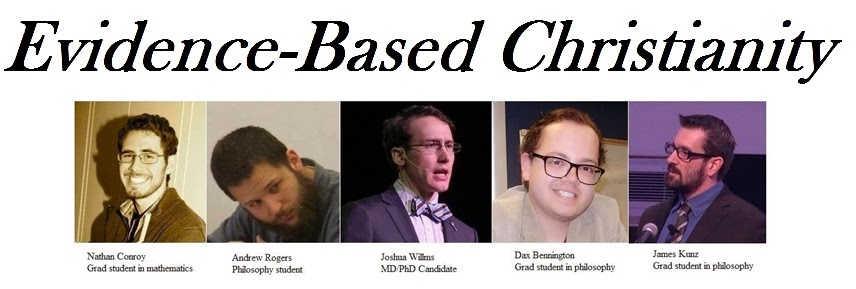Problem
Two problems present themselves to the person investigating the credibility of the New Testament.
- Do the copies of the N.T. that we have today reflect what the writings of the N.T. originally contained?
- Did the writers reflect the Jesus of history?
Let's expand on these two problems.
(1) We have only copies of copies of copies of the N.T. Many of these are only fragmentary. How do we know that these reflect what the N.T. actually said?
In addition, the manuscripts differ amongst themselves. In fact it is estimated that we have 400,000 variants in the New Testament text. That is there are 400,000 different readings of the N.T. Almost every manuscript differs from the others in some respect. And some of these are almost certainly intentional.
Maybe the church changed the writings to suit their beliefs and to fit their agenda.
(2) It is sometimes said that the Jesus of history is a very different Jesus than the one presented us in the N.T. In fact, the Jesus of history was a great stoic teacher, or a political revolutionary, or a peaceable peasant sage, or someone who did not exist at all; and the N.T. reflects a distortion or a mythologization of this Jesus.
This seems plausible. it isn't impossible that an inspiring man's life would morph into a legend that embellishes on his teachings and character.
Resolution
To answer (1). We have over 5,600 MSS of the Greek New Testament. Some of these are within 50-100 years of the original writings. We have over 10,000 versions of the N.T., that is, translations into other languages than Greek. We have over a million quotations of the N.T. from the Church Fathers. From these quotations alone we may reconstruct the majority of the N.T. without even looking at the MSS.
And yes, there are very many variants. However, most of the variants hardly give us differences in the meaning of any book or the passage of any book.
In fact, the plethora of N.T. variants actually helps us understand what the Bible originally contained. First, if there was any doubt in the first place, it proves that no one standardized the text. So no church controlled all the manuscripts.
Further, the science of textual criticism has many reasonable methods of arbitrating between these. I’ll describe one.
Say we have manuscript A and manuscript B. And say that these differ. But they are clearly similar to one another. It is reasonable to assume that they represent a common, and earlier, reading of the N.T. We may compare readings that because of geographical and lexicographical distance must have had a distant common ancestor and achieve strong confidence in how early the documents ought to be dated.
Bart Ehrman, a prominent N.T. critique, and certainly non-biased authority, even says, "Scholars are convinced that we can reconstruct the original words of the N.T. with reasonable (although probably not 100%) accuracy."
The general consensus of those who study these things for a living under peer review is that we do largely have the original documents.
To answer (2). The other question faces us. Do the writings of the N.T. reflect the Jesus of history? We know that people are unreliable and are given to sensationalism. They also cheat and lie for private gain. Sometimes they are bad relayers of information, purely accidentally. Like the game of telephone an original message may become garbled over time, changed completely from what it was.
The N.T. could not have developed in this way for a few reasons.
- At the heart of the Christian message is a crucified and resurrected Jewish messiah.
- This message would not have been palatable to the Romans, Greeks, or Jews
- The Romans, Greeks, and every nonJewish person was not looking for the resolution to Israel's O.T. story. They were not looking forward to God's promises to Abraham and David.
- Further the Romans would have taken the Christian message as treasonous. For the Christians proclaimed a Jewish King who was King over everything in the whole world. The Christians said this man overcame the Roman legal system. It was tantamount to suicide to proclaim this message.
- And further, the Greeks had no place for the material resurrection of the human body that the resurrection promised.
- Even the Jewish people expected someone very different than this Jesus. They expected a political deliverance from Rome. They were looking for a King like David that would restore the national kingdom of Israel. Needless to say, Jesus did not do this.
- Basically, it fit no one's expectation. It fit no one's story. It even was against everyone's story on a deep level. So it is hard to imagine anyone intentionally distorting the main message: a crucified and resurrected Jewish messiah. Given it’s disagreeableness to the Roman government, among these other reasons, a lie would hardly gain him anything. And further, a liar couldn't expect success. The message wouldn't appeal to anybody unless you could produce very strong evidence, for instance: the mass testimonial witness the N.T. proclaims.
- It is no less easy to imagine the story being a mythologization. A myth would tend to fit the tastes of the people, and myth does not base itself on open and observable fact. This is precisely what the N.T. argues is the case.
In the absence of any evidence to the contrary, the only explanation is that the N.T. does indeed give an accurate picture of the proclamation of the earliest Christians. The Jewish messiah came into this world and was very different than what anyone had expected.

